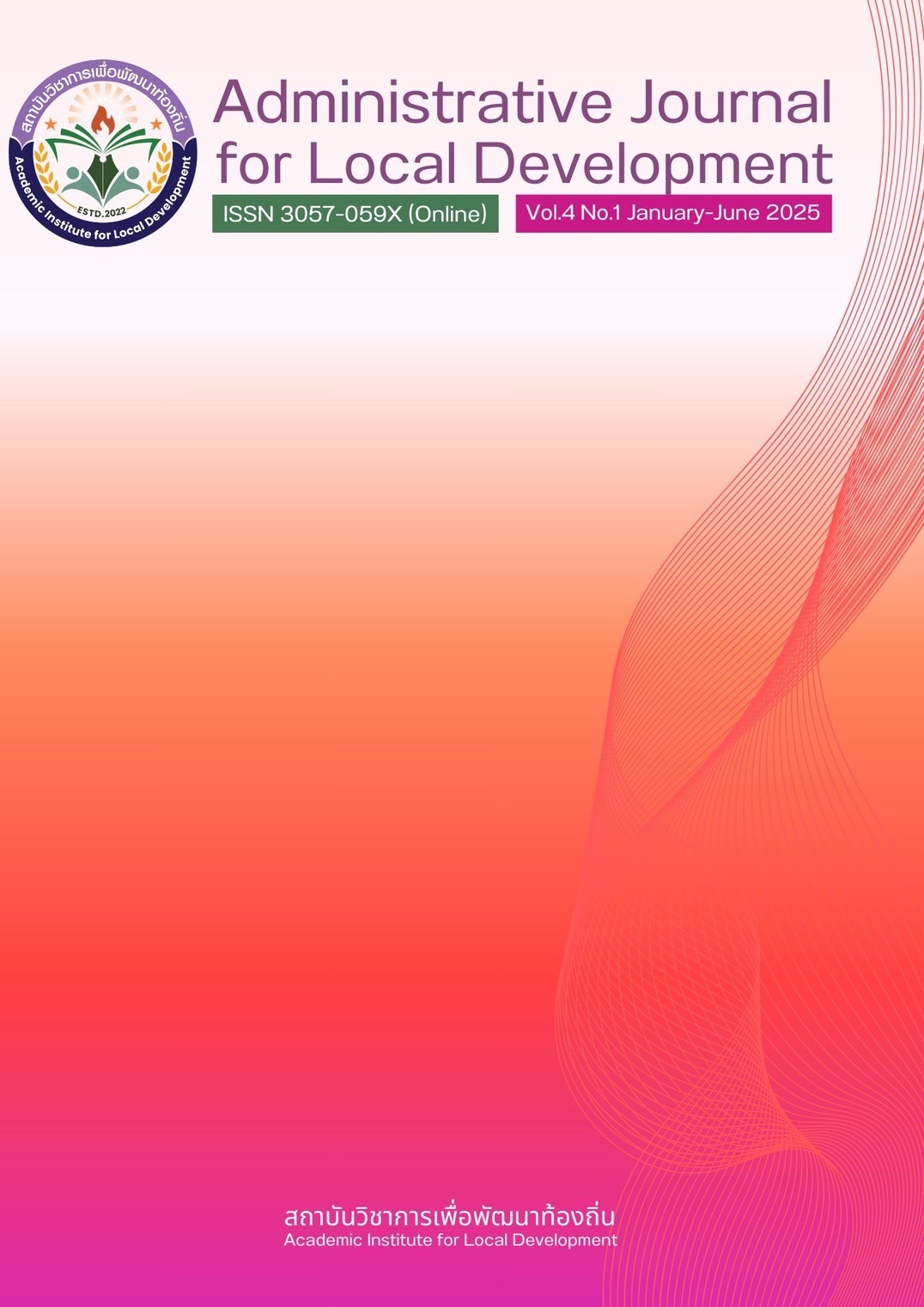รูปแบบการพึ่งพาตนเองของชุมชน: กรอบงาน กลยุทธ์ และมุมมองระดับโลก
DOI:
https://doi.org/10.14456/ajfld.2025.8คำสำคัญ:
รูปแบบการพึ่งพาตนเองของชุมชน, กรอบการทำงาน,กลยุทธ์, มุมมองระดับโลกบทคัดย่อ
แนวคิดหลักในการส่งเสริมการพัฒนาอย่างยั่งยืนคือการพึ่งพาตนเองของชุมชน ซึ่งทำให้ชุมชนท้องถิ่นมีความสามารถในการจัดการกับปัญหาทางเศรษฐกิจ สังคม และสิ่งแวดล้อมด้วยตนเอง บทความวิจารณ์นี้ใช้ข้อมูลจากการวิจัยสหวิทยาการและกรณีศึกษาในระดับโลกเพื่อศึกษากรอบทฤษฎี โมเดล และกลวิธีที่สนับสนุนการพึ่งพาตนเองของชุมชน โดยพิจารณาถึงกรอบแนวคิดสำคัญต่างๆ เช่น โครงการในชุมชน พันธมิตรความร่วมมือ และกลยุทธ์การดำรงชีพอย่างยั่งยืน โดยเน้นที่ประสิทธิภาพในการทำงานในสภาพแวดล้อมต่างๆ นอกจากนี้ บทความยังกล่าวถึงวิธีการสร้างชุมชนที่พึ่งพาตนเองได้ โดยเน้นที่การสนับสนุนจากรัฐบาล การใช้ทรัพยากร และการสร้างขีดความสามารถ นอกเหนือจากการพัฒนาและแนวโน้มใหม่ๆ ในอุตสาหกรรมแล้ว ยังครอบคลุมถึงปัญหาต่างๆ เช่น ข้อจำกัดในการบริหาร การขาดแคลนทรัพยากร และความไม่เท่าเทียมกันทางเศรษฐกิจและสังคม บทความวิจารณ์นี้เสนอแนะแนวทางปฏิบัติสำหรับผู้กำหนดนโยบาย ผู้ปฏิบัติงาน และผู้นำชุมชน เพื่อปรับปรุงการพึ่งพาตนเองและส่งเสริมการพัฒนาที่ยั่งยืนและครอบคลุม โดยเปรียบเทียบวิธีการและบทเรียนที่เรียนรู้จากทั่วโลก
Downloads
เอกสารอ้างอิง
Acharya, K. P. (2002). Twenty-four years of community forestry in Nepal. International Forestry Review, 4(2), 149-156. https://doi.org/10.1505/IFOR.4.2.149.17408
Adger, W. N. (2000). Social and ecological resilience: Are they related? Progress in Human Geography, 24(3), 347-364. https://doi.org/10.1191/030913200701540465
Aker, J. C. (2011). Dial “A” for agriculture: Using information and communication technologies for agricultural extension in developing countries. Agricultural Economics, 42(6), 631-647. https://doi.org/10.1111/j.1574-0862.2011.00545.x
Berhane, G., Gilligan, D. O., Hoddinott, J., Kumar, N., & Taffesse, A. S. (2014). Can social protection work in Africa? The impact of Ethiopia’s Productive Safety Net Programme. Economic Development and Cultural Change, 63(1), 1-26. https://doi.org/10.1086/677753
Berkes, F. (2009). Indigenous ways of knowing and the study of environmental change. Journal of the Royal Society of New Zealand, 39(4), 151-156. https://doi.org/10.1080/03014220909510568
Berkes, F., & Ross, H. (2013). Community resilience: Toward an integrated approach. Society & Natural Resources, 26(1), 5-20. https://doi.org/10.1080/08941920.2012.736605
Bornstein, D., & Davis, S. (2010). Social entrepreneurship: What everyone needs to know. Oxford University Press.
Brundtland Commission. (1987). Our common future. Oxford University Press.
Chambers, R., & Conway, G. R. (1992). Sustainable rural livelihoods: Practical concepts for the 21st century. IDS Discussion Paper, 296.
Chaskin, R. J. (2001). Building community capacity: A definitional framework and case studies from a comprehensive community initiative. Urban Affairs Review, 36(3), 291-323. https://doi.org/10.1177/10780870122184876
Dutta, S. (2019). Solar Sister: Empowering women entrepreneurs to promote energy access in Africa. Energy Research & Social Science, 56, 101209. https://doi.org/10.1016/j.erss.2019.101209
Eade, D. (1997). Capacity-building: An approach to people-centred development. Oxfam.
Elkington, J. (1998). Cannibals with forks: The triple bottom line of 21st-century business. Capstone.
Flora, C. B., & Flora, J. L. (2013). Rural communities: Legacy and change. Westview Press.
Folke, C., Carpenter, S. R., Walker, B., Scheffer, M., Chapin, T., & Rockström, J. (2005). Resilience thinking: Integrating resilience, adaptability, and transformability. Ecology and Society, 15(4). https://doi.org/10.5751/ES-03610-150420
Gandhi, M. K. (1945). Constructive programme: Its meaning and place. Navajivan Publishing House.
Hickey, S., & Mohan, G. (2004). Participation: From tyranny to transformation? Exploring new approaches to participation in development. Zed Books.
Holling, C. S. (1973). Resilience and stability of ecological systems. Annual Review of Ecology and Systematics, 4(1), 1-23. https://doi.org/10.1146/annurev.es.04.110173.000245
Kabeer, N. (2005). Gender equality and women's empowerment: A critical analysis of the third Millennium Development Goal. Gender & Development, 13(1), 13-24. https://doi.org/10.1080/13552070512331332273
Koch, D. J. (2020). Partnerships for development: The evolution and promise of public-private collaborations. Development Policy Review, 38(5), 591-610. https://doi.org/10.1111/dpr.12444
Mansuri, G., & Rao, V. (2013). Localizing development: Does participation work? World Bank Publications. https://doi.org/10.1596/978-0-8213-8256-1
Nambiar, D., & Raj, P. (2020). Skill development for self-reliance: Insights from vocational training programs. Development in Practice, 30(5), 602-612. https://doi.org/10.1080/09614524.2020.1757604
Narayan, D., Patel, R., Schafft, K., Rademacher, A., & Koch-Schulte, S. (2000). Voices of the poor: Can anyone hear us? Oxford University Press.
Nyerere, J. (1968). Ujamaa: Essays on socialism. Oxford University Press.
Ostrom, E. (1990). Governing the commons: The evolution of institutions for collective action. Cambridge University Press.
Pretty, J. (2003). Social capital and the collective management of resources. Science, 302(5652), 1912-1914. https://doi.org/10.1126/science.1090847
Putnam, R. D. (1995). Bowling alone: America's declining social capital. Journal of Democracy, 6(1), 65-78. https://doi.org/10.1353/jod.1995.0002
Roy, M. (2012). Empowering women through grassroots initiatives: The case of Barefoot College, India. Energy for Sustainable Development, 16(1), 54-59. https://doi.org/10.1016/j.esd.2011.12.006
Scoones, I. (1998). Sustainable rural livelihoods: A framework for analysis. IDS Working Paper, 72.
Soares, F. V., Ribas, R. P., & Osório, R. G. (2010). Evaluating the impact of Brazil's Bolsa Família: Cash transfer programs in comparative perspective. Latin American Research Review, 45(2), 173-190. https://doi.org/10.1353/lar.0.0121
United Nations. (2015). Transforming our world: The 2030 agenda for sustainable development. United Nations.
Zimmerman, M. A. (2000). Empowerment theory: Psychological, organizational and community levels of analysis. In J. Rappaport & E. Seidman (Eds.), Handbook of community psychology 43-63. Springer.
ดาวน์โหลด
เผยแพร่แล้ว
รูปแบบการอ้างอิง
ฉบับ
ประเภทบทความ
หมวดหมู่
สัญญาอนุญาต
ลิขสิทธิ์ (c) 2025 Administrative Journal for Local Development

อนุญาตภายใต้เงื่อนไข Creative Commons Attribution-NonCommercial-NoDerivatives 4.0 International License.










